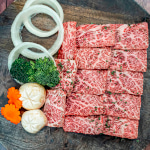National Wagyu Day Date in the current year: June 21, 2026
 June 21 is a great day to splurge and treat yourself to a delicious steak or burger because it is National Wagyu Day. It celebrates a type of beef popular around the globe due to its exquisite taste and unparalleled tenderness.
June 21 is a great day to splurge and treat yourself to a delicious steak or burger because it is National Wagyu Day. It celebrates a type of beef popular around the globe due to its exquisite taste and unparalleled tenderness.Wagyu is the collective name for four principal Japanese cattle breeds; the word wagyu is literally translated from Japanese as “Japanese cattle”. Cattle were presumably brought to Japan from China or the Korean peninsula sometime before the 5th century. They were primarily used as draft animals and as a source of fertilizer, but their meat was not consumed for cultural and religious reasons. Cattle breeding was focused on producing healthy and obedient animals.
The Japanese began to consume meat under Western influence, when Japan opened some of its ports to trade in the mid-19th century. The first slaughterhouse in Japan opened near the port of Kobe in 1868, and residents of the nearby foreign settlement praised Japanese beef as having a superior taste compared to European beef.
In the early 20th century, the Japanese government established a systematic breeding program to improve Japanese breeds of beef cattle by cross-breeding them with imported stock. All modern Wagyu cattle derive from that breeding program, except for the critically endangered Mishima cattle.
Wagyu beef shipped from Japan is known by different names depending on its place of origin, such as Kobe beef, Matsusaka beef, Ōmi beef or Yonezawa beef. Wagyu breeds are also farmed outside of Japan, for example, in Australia, Canada, the United Kingdom, and the United States. Their meat is usually branded as “Australian Wagyu”, “American Wagyu”, etc.
But what makes Wagyu beef so special? Beef from Japanese cattle is marbled, i.e. contains streaks of intramuscular fat that give it a marble-like appearance. The fat makes the meat tender and moist, as well as adds flavor. Its tenderness and unique taste make Wagyu beef a delicacy. Because of this, as well as a limited supply of Wagyu cattle, this culinary delight can be rather expensive.
Due to its exclusivity and high cost, there is a rigorous Wagyu authentication process that helps to maintain the quality standards associated with Wagyu beef. Each Wagyu carcass is issued a certificate of authenticity with a 10-digit cattle ID. You can request a copy of the certificate from the vendor/restaurant and enter the ID on the Japan Carcass Verification Bureau website to make sure you have been sold/served genuine Wagyu beef. Keep in mind that Wagyu beef produced in countries other than Japan is certified by their respective Wagyu breeder associations and has its own authentication process.
National Wagyu Day was launched in 2022 by steak connoisseur Serve Haddadin, who chose the date of June 21 for the holiday because it was his birthday. The main goal of Wagyu Day is to celebrate the remarkable taste of the legendary beef and raise awareness of the Wagyu authentication process.
The best way to celebrate National Wagyu Day is to go out to a restaurant that specializes in Wagyu beef and treat yourself to a nice meal. You can also pick up some Wagyu beef and cook it at home, but only if you’re an experienced cook because Wagyu beef is expensive and it would be a shame for it to go to waste. And don’t forget to spread the word about the holiday on social media with the hashtag #NationalWagyuDay!
- Category
- Unofficial Holidays
- Country
- USA
- Tags
- National Wagyu Day, food days, unofficial holidays, observances in the US, Wagyu beef, Wagyu cattle